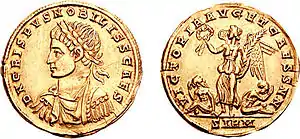326
Year 326 (CCCXXVI) was a common year starting on Saturday (link will display the full calendar) of the Julian calendar. At the time, it was known as the Year of the Consulship of Constantinus and Constantinus (or, less frequently, year 1079 Ab urbe condita). The denomination 326 for this year has been used since the early medieval period, when the Anno Domini calendar era became the prevalent method in Europe for naming years.
| Millennium: | 1st millennium |
|---|---|
| Centuries: | |
| Decades: | |
| Years: |
| 326 by topic |
|---|
| Leaders |
|
| Categories |
|
| Gregorian calendar | 326 CCCXXVI |
| Ab urbe condita | 1079 |
| Assyrian calendar | 5076 |
| Balinese saka calendar | 247–248 |
| Bengali calendar | −267 |
| Berber calendar | 1276 |
| Buddhist calendar | 870 |
| Burmese calendar | −312 |
| Byzantine calendar | 5834–5835 |
| Chinese calendar | 乙酉年 (Wood Rooster) 3022 or 2962 — to — 丙戌年 (Fire Dog) 3023 or 2963 |
| Coptic calendar | 42–43 |
| Discordian calendar | 1492 |
| Ethiopian calendar | 318–319 |
| Hebrew calendar | 4086–4087 |
| Hindu calendars | |
| - Vikram Samvat | 382–383 |
| - Shaka Samvat | 247–248 |
| - Kali Yuga | 3426–3427 |
| Holocene calendar | 10326 |
| Iranian calendar | 296 BP – 295 BP |
| Islamic calendar | 305 BH – 304 BH |
| Javanese calendar | 207–208 |
| Julian calendar | 326 CCCXXVI |
| Korean calendar | 2659 |
| Minguo calendar | 1586 before ROC 民前1586年 |
| Nanakshahi calendar | −1142 |
| Seleucid era | 637/638 AG |
| Thai solar calendar | 868–869 |
| Tibetan calendar | 阴木鸡年 (female Wood-Rooster) 452 or 71 or −701 — to — 阳火狗年 (male Fire-Dog) 453 or 72 or −700 |

Coin of Crispus Caesar (c. 303–326)
Events
Roman Empire
- Emperor Constantine the Great travels to Rome to celebrate the 20th anniversary of his accession to power, but while en route at Pola he orders his older son, Crispus Caesar, to be executed, possibly on charges of adultery. Later, Fausta, second wife of Constantine I, is also executed by being suffocated in a hot bath.
- Constantine I founds Constantinople and incorporates Byzantium into the new capital. He reorganises the Roman army in smaller units classified into three grades: palatini, (imperial escort armies); comitatenses, (forces based in frontier provinces) and limitanei (auxilia border troops).
- Constantine I promulgates laws against the prostitution of maidservants, and for the humanization of prisons.
Art
- Constantine the Great, from the Basilica of Maxentius and Constantine in Rome, is finished. It is now kept at Palazzo dei Conservatori, Rome.
Religion
- September 14 (traditional date) – Helena, mother of Constantine I, discovers the so-called True Cross and the Holy Sepulchre (Jesus's tomb) in Jerusalem. On her pilgrimage, she pauses on the Aegean island of Patmos, where she is said to found the church of Panagia Ekatontapiliani.
- Helena tells Constantine that he must atone for executing his son and wife by building churches, and at about this date construction begins on Old St. Peter's Basilica, the first church on the traditional site of Saint Peter's tomb in Rome, and on the basilica of Golgotha on Calvary outside Jerusalem.
- Christianity is introduced to the Kingdom of Iberia (modern-day Georgia) by Saint Nino (approximate date).
Births
Deaths
- Flavius Julius Crispus, son of Constantine I (b. 303)
- Flavia Maxima Fausta, Roman empress (b. 289)
- Licinius II, Roman consul and caesar (b. 315)
- Liu (or Xianlie), Chinese empress of Han Zhao
This article is issued from Wikipedia. The text is licensed under Creative Commons - Attribution - Sharealike. Additional terms may apply for the media files.